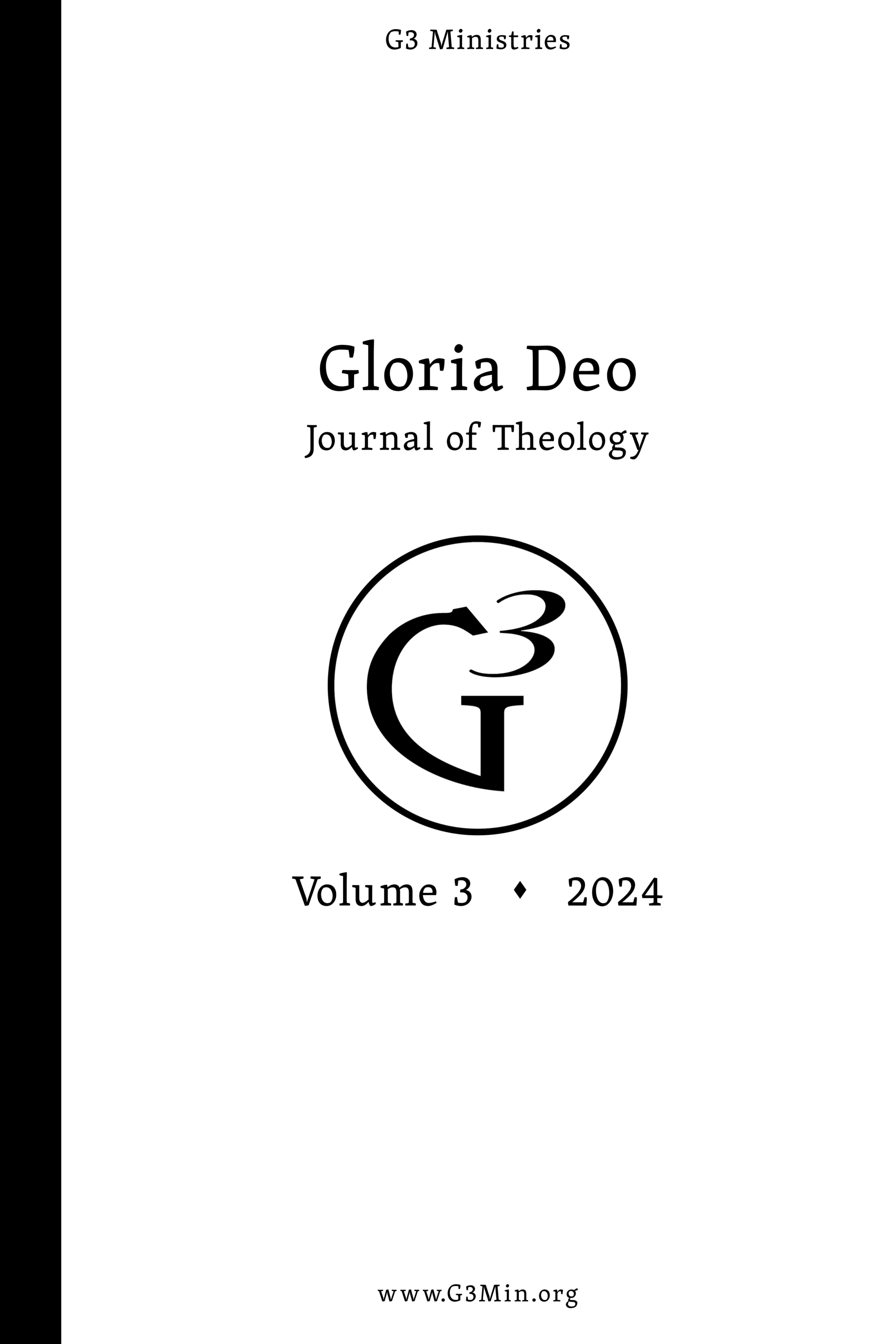Purchase Print Journal (coming soon)
Gloria Deo Journal of Theology is an evangelical theological journal published annually at www.G3Min.org by G3 Ministries. It focuses on biblical, theological, and historical topics for pastors.
Publisher: Josh Buice
Editor-in-Chief: Scott Aniol | [email protected]
Editorial Committee: Chip Thornton, Owen Strachan
Editorial Assistant: Laramie Minga
Volume 3 (2024)
Worth Prison: Why Corporate Worship Is Essential
James Coates
Corporate worship isn’t just worth prison, it’s actually worth dying for. That’s exactly what Jesus did. He died and rose again to redeem us from the slave market of sin that we might come together as one body and continually offer up a sacrifice of praise (Heb 13:15); that “with one accord [we] might with one voice glorify the God and Father of our Lord Jesus Christ” (Rom 15:6). Jesus didn’t just die to deliver us from the penalty and power of sin; He died “to purify for Himself a people for His own possession, zealous for good deeds” (Tit 2:14; emphasis added), not the least of which is corporate worship. Jesus died and rose again to make us zealous to worship Him corporately. Corporate worship is most definitely worth dying for.
The Mission of the Church and the Mission of the State: Honoring Christ’s Authority to Define Proper Domains
Jeff Moore
Jesus Christ alone has divine authority to define proper domains related to church and state. One of the most well-known passages in all of Christian Scripture is the Great Commission. However, there is a significant authority issue in the Great Commission that is often overlooked in evangelical teaching on this passage. Preachers commonly cite this passage starting in verse 19, “Go therefore …” But the “therefore” has its place in Christ’s commission for a reason—it points back to what was stated in verse 18. Christ sends out his apostles precisely because the Father has given the Son all authority.
One “Holy Nation” in Christ: Christian Nationalism in Historical and Theological Perspective
Owen Strachan
Three years ago, hardly anyone had a word to say about “Christian Na-tionalism.” Fast forward to 2024, and it’s an incessantly-referenced phrase. Seemingly overnight, “Christian Nationalism” (henceforth CN) has become nearly the most-discussed concept in the Christian church. Given our tribalistic nature, camps regarding CN have emerged as well. For some, if you are CN-inclined, you are optimistic and bold and taking the Lordship of Christ seriously, but if you are not CN-inclined, you might have a predisposition to “loser theology,” and you may not know “what time it is” in Western history, and you may be obsolete soon.
A Higher Kingdom: Pure Worship from a Pure Church
Scott Aniol
The solution to grappling with the tensions and problems we see all around us in this present evil age is found when we look with eyes of faith to the unseen eternal heavenly sanctuary. Thus, in this paper I will explore the essential relationship between the heavenly and earthly realities between the fall of mankind and the return of Christ and argue that a biblical understanding of this relationship recognizing a necessary distinction between kingdom and cultus in this age, which will be united as God intended when Christ comes again.
Affective Theology: A Theology of the Affections from Four Theologians
David de Bruyn
Within church history, a group of theologians have espoused what might be called a “theology of the affections” or a “theology of the heart.” Though these theologians have been distant from one another on several theological points, what unites them is a distinctive psychology, spirituality and epistemology of the Christian life, centered on what have been called the “affections.” This paper outlines what unifies the distinctive approaches of affective theology by referencing the works of four prominent affective theologians. Affective theology continues to offer helpful insights and applications for worship and discipleship.
The four primary theologians referenced here are Augustine of Hippo, Blaise Pascal, Jonathan Edwards, and C. S. Lewis. These four represent a form of affective theology rooted in love and beauty as the core of the Christian life. A sample of secondary affective theologians would be Bernard of Clairvaux, Anselm of Canterbury, Richard Sibbes, John Owen, Thomas Chalmers, and G. K. Chesterton. Thomas Aquinas wrote extensively on anthropology and psychology, but his view of the passions differs from the four profiled in this paper.
Misenchantment and the Edwardsian Imaginary
Clinton Manley
In his most famous sermon, “The Weight of Glory,” C.S. Lewis preaches that “you and I have need of the strongest spell that can be found to wake us from the evil enchantment of worldliness which has been laid upon us for nearly a hundred years.” Lewis, along with J.R.R. Tolkien and the rest of the Inklings, was determined to fight back against the misenchantment of modernity—namely, the naturalistic, mechanistic, deistic darkness that had descended on the West through the Enlightenment. But well over a hundred years before this rebel group of incendiaries, Jonathan Edwards cast that “strongest spell,” intentionally rejecting the philosophies that were disenchanting the world in his day—and ours.




